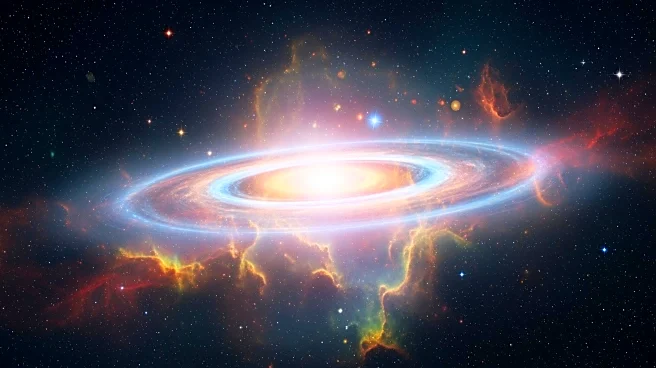What's Happening?
Astronomers have detected doubly-deuterated water (D₂O), also known as 'heavy water,' in a planet-forming disk around the young star V883 Ori, located approximately 1,300 light years away. This discovery marks the first time such water, which contains
two deuterium atoms replacing hydrogen, has been found in a planet-forming environment. The presence of heavy water suggests that some planetary water is inherited from ancient interstellar ice rather than being newly formed within the disk. The study, published in Nature Astronomy, highlights that the heavy water observed is older than the star itself, having formed during the earliest stages of star and planet development. This finding supports the idea that water can survive from the coldest stages of space and be incorporated into new planetary systems.
Why It's Important?
The discovery of ancient heavy water in a planet-forming disk has significant implications for understanding the origins of water in planetary systems, including our own. It suggests that many young planets may inherit water that is far older than themselves, potentially increasing the likelihood of water-rich environments conducive to life. This finding could reshape theories about the formation of water on Earth and other planets, indicating that the seeds for water, and possibly life, were present from the very beginning of planetary formation. The study also provides a new perspective on the chemical history of water, linking interstellar clouds, disks, and icy bodies with a continuous chemical thread.
What's Next?
Future research will focus on mapping D₂O across more disks to determine how common this inheritance of ancient water is. Astronomers will also study the snow line, the radius where water remains frozen, to understand how it shifts as young stars evolve. These investigations will help determine the relationship between water-rich zones and planet-forming regions, providing insights into the conditions necessary for the development of habitable planets. Enhanced sensitivity in future observations will allow for the detection of fainter molecular lines, offering a more comprehensive understanding of the chemical processes from interstellar clouds to the formation of new worlds.
Beyond the Headlines
The presence of ancient water in planet-forming disks raises intriguing questions about the potential for life elsewhere in the universe. If interstellar ice seeded our solar system, similar processes could occur in other systems, suggesting that the building blocks for life might be more widespread than previously thought. This discovery also emphasizes the importance of water in the habitability of planets, as it plays a crucial role in the formation and migration of solids within disks. Understanding the origins and distribution of water in space could provide valuable insights into the conditions necessary for life to emerge.















